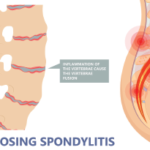At Week 52, 86% of patients remained in MEASURE 1 and 83% of patients remained in MEASURE 2. The investigators documented sustained improvements through 52 weeks.
Safety
Patients receiving secukinumab did have more infections, including candidiasis, than patients receiving placebo. Additionally, four individuals who received secukinumab experienced Grade 3 neutropenia, and one individual in the treatment group experienced Grade 4 neutropenia. In all cases, the neutropenia was documented in only a single visit. Three patients in the treatment groups had major adverse cardiac events, including myocardial infarction, stroke and fatal myocardial infarction. Five people were diagnosed with cancer while receiving secukinumab and discontinued treatment. Five patients in the treatment groups were diagnosed with Crohn’s disease, but four of these patients had a history of Crohn’s disease or other problems of the colon diagnosed prior to the study. Seven individuals in the treatment groups were diagnosed with uveitis, five of whom had a history of uveitis. Although one patient developed neutralizing antibodies to secukinumab at Week 52, the patient did not lose ASAS20 response and had no immune-related adverse events.
Lara C. Pullen, PhD, is a medical writer based in the Chicago area.
Reference
- Baeten D, Sieper J, Braun J, et al. Secukinumab, an interleukin-17A inhibitor, in ankylosing spondylitis. N Engl J Med. 2015 Dec 24;373(26):2534–2548. doi: 10.1056/NEJMoa1505066.



